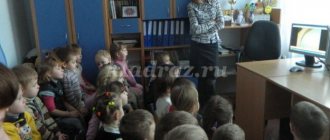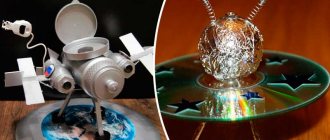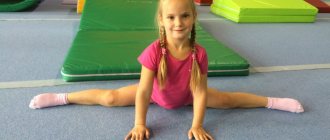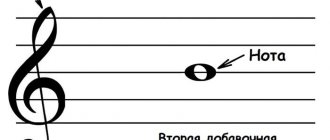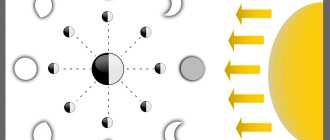Project “Boundless Space” 2016 (2nd junior group)
Project: "Endless Space".
Relevance of the topic:
children do not know the holiday - Cosmonautics Day, about the first flight of Yuri Alekseevich Gagarin into space. This project was created to solve this problem. Justification of the problem: 1. Parents pay insufficient attention to Russian holidays, namely, Cosmonautics Day. 2. Children have no knowledge about space, the first person to fly into space, or the existence of a holiday in Russia - Cosmonautics Day.
Type of project : group, creative, educational, research, gaming.
Project duration: 7 days. Short-term (04/07/2016 – 04/12/2016)
Educational activities: knowledge, artistic creativity, reading fiction.
Project participants : children of the second younger group (age 3 - 4 years), group teachers, parents and other family members of the students.
Project goal : to introduce children to the Russian holiday - Cosmonautics Day, to space, to the first cosmonaut Yu.A. Gagarin
Tasks for children:
Educational: 1. give an idea of space and the first cosmonaut Gagarin; 2. introduce the holidays on April 12; 3. teach children a culture of communication; 4. improve the ability to perform movements as demonstrated by the teacher.
Educational:
1. develop aesthetic perception, imagination, artistic taste; 2. develop creative abilities in the process of integrating various types of activities, imagination; 3. develop attention, memory, visual and effective thinking; 4. develop children’s cognitive activity; 5. develop village hand skills; 6. activate the vocabulary: planet, space, constellation, rocket, spacesuit, moon, universe. cosmonaft;
Educational:
1. cultivate a love for the cosmonaut profession; 2. cultivate positive personality traits of the child; activity, neatness; 3. cultivate mutual assistance and friendly attitude towards each other; 4. cultivate pride in the people of this profession, love for the astronaut profession, for one’s homeland; 5. improve work skills.
Tasks for the teacher: to develop social and professional competence and personal potential.
Tasks for parents: support the child in showing creative initiative
Expected result: in the process of interaction between teacher - children - parents in the implementation of the project:
children:
- acquire knowledge about space, astronauts, and become interested in this topic;
- will show respect for handmade crafts
- will develop aesthetic perception, creativity, artistic taste;
- there will be an interest in space-themed crafts;
- will take the initiative on their own: look at the illustrations; participate in conversations, ask questions; construct from building materials, construction sets, rockets according to your own ideas.
parents:
1. enriching parental experience of interaction and cooperation with the child in the family; 2. parents will become interested in their children’s activities.
Project products:
- Decoration of the hall and reception
- Exhibition of information stand on the theme "Space"
- Exhibition of works by children completed during the “Endless Space” project
- Production of a collection of poems on the theme “Space”
- Presentation of the project in the form of gaming entertainment “Space Travel”
1. Preparatory stage: a.) Determination by the teacher of the topic, goals, objectives, content of the project, forecasting the result, forms of expressing the results of project activities. b.) Discussion with parents of the project, clarifying the possibilities, funds necessary for the implementation of the project, determining the content of the activities of all project participants. c) Select methodological and fiction literature on this topic. d.) Prepare materials for conducting the role-playing game “Space Travel”. 2. The main stage of the project implementation: - Content of the teacher’s activity: Distributes roles. Plans and organizes activities. He talks in a dialogue form with children about space, about the first cosmonaut Yu.A. Gagarin. Arouses interest in the theme of the matinee. Involves parents in information activities - Content of children's activities: Making crafts. Participation in various educational periods. Memorizing poetry. — Content of parents’ activities: Selection of information about space. Participation in kindergarten events. Implementation of the project through different types of activities. 1. Conversation “What kind of sky is it?” 2. Conversation “For children about space” 3. Construction “Rocket” 4. Application “Flight into space” 5. Modeling “Let’s launch rockets into space” 6. Viewing the presentation “April 12 - Cosmonautics Day” Application “Endless Space” 7. Final sports and game event “Space Travel” 8. Reading poems on the theme “Space”, asking riddles 9. Watching cartoons “Belka and Strelka”, “Luntik”, “Dunno on the Moon”
MAGAZINE Preschooler.RF
Project: “Mysterious Space”Second junior group Educator: Kolobanova T.S. Lyubertsy 2018 Municipal preschool educational institution kindergarten No. 58 “Joy”
Modern children have ceased to be interested in the topic of space. In modern times, flights into outer space have become an everyday reality, and therefore children’s interest in astronautics is gradually fading away. It is necessary to interest children by creating an atmosphere for them in which they want to learn about space on their own.
Problem: Insufficient attention of parents to the Russian holiday - Cosmonautics Day. Children's superficial knowledge about space, the first man to fly into space, the existence of a holiday in Russia - Cosmonautics Day.
Project type: educational and creative, short-term.
Objective of the project.
Formation of ideas about space, cosmonauts, planets; introduce children to the Russian holiday - Cosmonautics Day, with the first cosmonaut Yu.A. Gagarin.
Tasks.
Educational:
To give children knowledge about the Russian holiday - Cosmonautics Day, about space, about the first cosmonaut Yu.A. Gagarin. Arouse interest in looking at illustrations about space. Teach activity and collectivism.
Educational:
Develop children's creative abilities. To develop children's speech, imagination and thinking, the ability to interact with each other, to encourage children to work together. Activate vocabulary: planet, space, constellation, rocket, spacesuit, moon, universe, astronaut.
Educational:
Foster respect for people working in space. Instill love and pride for your country. To develop in children the ability to listen to adults.
Project participants.
Children of the younger group (age 3-4 years), parents, teachers.
Project type.
Creative, information and research.
Duration.
Short term (one week) 4.04. 2022 – April 12, 2022
Expected results:
For children:
Children's interest in the topic of space, the manifestation of their cognitive activity, expanding children's horizons and vocabulary, increasing the level of children's knowledge about space.
Children take the initiative on their own: look at illustrations, participate in conversations, ask questions; They construct rockets from building materials, construction sets, according to their own ideas, and show creativity and detail in their work.
For parents: changing the attitude of parents to this problem, involving them in joint activities with children.
For the teacher: to increase the professional personal growth of teachers on this topic.
Project development.
Inform project participants of the importance of this topic. Create a subject-development environment: select materials, toys, attributes for gaming and cognitive activities, illustrative material, fiction, material on this topic.
Draw up a long-term action plan.
Project implementation stages:
Stage 1 - preparatory
- identifying children's initial knowledge about space
- information from parents about upcoming activities
- selection of literature about space, photographs, posters.
Stage 2 – main
- review of material on the topic “Space”
- lesson: speech development “Profession - astronaut”
- plasticineography "Planet Earth" and "Star Trek"
- reading poems, asking riddles on the theme “Space”
- laying out rockets from geometric shapes (by overlapping)
- physical education
Stage 3 – productive
- holding the final event “Space Travel”
- collective panel “Rocket for a robot”
- an exhibition of children's works completed during the "Endless Space" .
Main stage.
As a result of the work done at the preparatory stage, optimal conditions were created in our group for the implementation of the project. Based on the results of the first stage, we came to the conclusion that opportunities and practical experience make it possible to more fully and widely present the material on developing preschoolers’ knowledge about the “Cosmonautics Day” and achieve effective results on the topic of this project. In this area, we have drawn up a thematic plan for working with children of primary preschool age.
Forms of working with children.
- Conversation “What is space?”
- Conversation “For children about space”
- Construction of "Rocket"
- Application “First flight”
- Modeling "Let's launch rockets into space"
- Plasticineography "Planet Earth" and "Star Trek"
- Reading poems on the theme “Space” , asking riddles
Forms of work with parents.
Visual information; conversation “Introducing children and parents to the topic of the project” ;
folders - screens for parents: “Space” .
| Next > |
Project “All about space”
Author - compiler:
Samodurova Tatyana Aleksandrovna,
teacher 1st category
SP MAOU Lugovskoy Secondary School, Tyumen District
Teaching experience 10 years.
Relevance of the project
Modern children gain knowledge about space mainly from films and cartoons featuring space pirates, star wars and other alien creatures. All characters, as a rule, are fictitious and misinform preschoolers by talking about non-existent planets, and often evoke negative emotions in them and contribute to the development of fears. Therefore, it is important to competently organize work to develop children’s ideas about space.
It is impossible to talk briefly about the big space! Fascinated by any fact, everyone is captured, as if on a spaceship, by adventures to distant and unexplored planets of the solar system. That is why, when forming ideas about space among preschool children, a project methodology was chosen. The system of work on the topic “Space” assumes a person-oriented approach to the development of a child. The activity is aimed at developing mental, cognitive, and communication abilities, which are carried out through various types of children's activities. The content of educational activities is age-appropriate and gives children the ability to express their emotional experiences and acquired knowledge about space.
Goal: To introduce and deepen children's knowledge about space.
Tasks:
- To give children basic knowledge about the Russian holiday - Cosmonautics Day, about space, about the first cosmonaut Yu. A. Gagarin.
- Systematize ideas about the universe, the solar system and its planets.
- Form a concept of yourself as an inhabitant of planet Earth.
- Develop children's cognitive and intellectual abilities and their creative potential.
- Foster a sense of pride in the achievements of domestic scientists and astronauts.
- Clarify the meaning of words: space, universe, planets, astronaut, spacesuit, meteorites and others.
- Develop communication skills and friendly relationships.
Project participants: teacher, children, parents (legal representatives).
Project implementation period : short-term from 04/09/18. -13.04.18
Integration of educational areas:
Social and communicative development: Conversation “Earth is our home”,
role-playing games “We are astronauts”, “Flight to the moon”.
Cognitive development: direct educational activities - 2nd junior group “Acquaintance with space”, middle group “What do we know about space”, senior group “Space”, preparatory group “About space”. Entertainment in groups “The Adventures of Luntik” (Appendix No. 1), “Journey to the Planets”, quiz “Journey to the Stars”, “Space Distances”.
Speech development: reading fiction, conversations “Who are astronauts?”, “What kind of rockets are there?”, “About planets”, guessing riddles, memorizing poems, the speech game “Flight into space” (composing a story based on a series of plot pictures).
Artistic and aesthetic development: productive activities (drawing and sculpting “Rocket”, application “We will fly to the stars.”
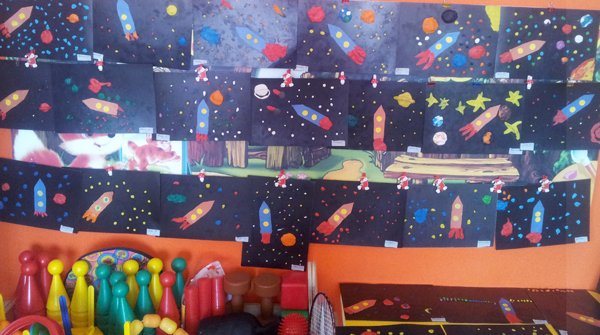
Physical development: “Space exercises”, outdoor games “Fast rockets are waiting for us”, “Planes”, “Who can circle the sun faster”, “Sleepwalkers”, sports entertainment “Travel to the planets”, “To become an astronaut”, “We astronauts", "Space adventures".
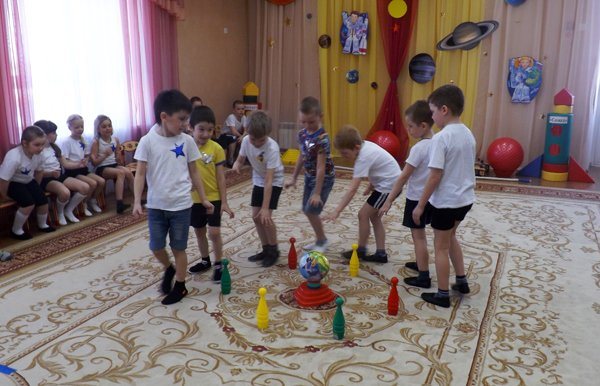
Work with parents of students: holding a morning meeting in the form of a quiz “What do you know about space?”, an exhibition of joint creativity between children and parents.
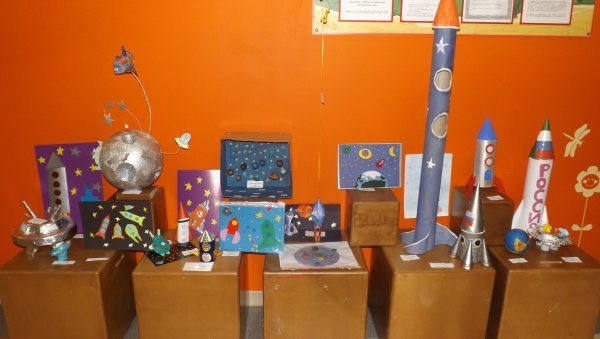
Expected results:
Children: consolidation of children’s basic knowledge on the topic “Space”, manifestation of cognitive activity. Construction by children from building material according to their own ideas, manifestation of children's creativity. The opportunity to participate in a project where children can apply existing knowledge on the topic, participate in competitions and competitions, and present their drawings and crafts.
Parents: parents’ acquisition of knowledge and practical skills when interacting with their child. Strengthening partnerships between parents and teachers.
Teachers: systematization and improvement of the quality of work with children on the development of cognitive and research abilities through various types of productive activities.
Project plan
| № | Event | Participants | Implementation deadlines |
| 1 | Sports entertainment “Travel to the planets”, “To become an astronaut”, “We are astronauts”, “Space adventures”. | Phys. instructor, teachers, children | 10.04 12.04 |
| 2 | Crafts competition “Space fantasies” | Teacher, children, parents | 9.04-13.04 |
| 3 | Direct educational activities | Teacher, children | 9.04-13.04 |
| 4 | Quiz “What do you know about space” | Children, parents, teacher | 12.04 |
| 5 | Entertainment “The Adventures of Luntik”, “Journey to the Planets”, quiz “Journey to the Stars”, “Space Distances”. | Teacher, children | 11.04- 13.04 |
The following results were obtained:
— Children have formed more accurate ideas about astronautics.
— Concepts were learned and reinforced: space, universe, planets, meteorites, astronaut and others.
— Ideas about the Universe, the solar system, and planets were formed.
— All planned events were carried out.
Final product: creating a layout on the theme “Space”
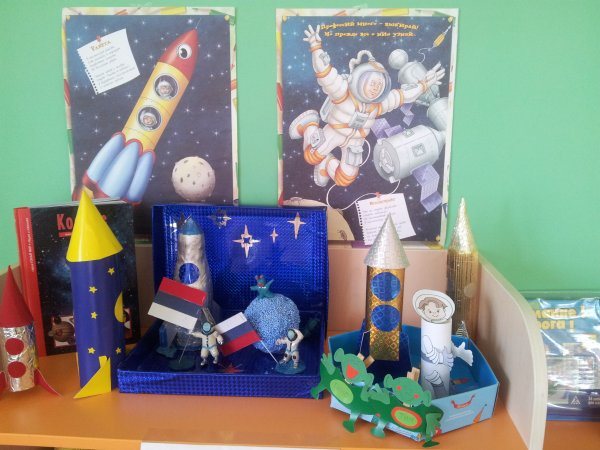
Annex 1
Entertainment "Luntik's Adventure"
Objectives: 1. To consolidate children’s knowledge about planets and space; 2. Expand children's horizons, develop thinking and speech; 3. Cultivate curiosity and goodwill. Educator: What do children call people who fly into space? Children: Cosmonaut. Educator: Do you want to be an astronaut? Children: Yes. Educator: Then you need to warm up well, otherwise they won’t hire you to be an astronaut without sports training. To become an astronaut, And to fly to distant planets, you need to be dexterous, strong, and be friends with physical education!
Warm-up - cosmodrome: Everything is ready for the flight - hands forward, up All the guys are waiting for rockets - hands together above their heads There is little time for take-off - we walk in place The astronauts stood in a row - jump, hands up, Bow to the right, to the left - bends Let's bow to the earth - bending forward The rocket flew - jumping on two legs Our cosmodrome was empty - crouched. Educator: Children, what is the name of our planet? Children: Earth Educator: Do you want to visit other planets? Children: Yes Educator: Then we’ll set off, and interesting tasks await us on each planet. Educator: So everyone is ready to start. Children: Yes Teacher: Fasten your seat belts. Do you have children. Educator: Turn on the ignition. Do you have children. Educator: We begin the report - 1,2,3,4,5 - launch (hands forward, flew, pretending to be a rocket, music sounds). Educator: How is the flight going? Children: Okay Teacher: Attention, our first stop is the planet Moon. Look, we are welcomed on this planet. Hello, what's your name? Luntik: Hello, my name is Luntik. Educator: Luntik, why is your place so dirty? (lumps of compressed paper are scattered on the floor) Luntik: The inhabitants of our planet have littered here so much that I can’t handle it alone? Educator: Guys, let's help put things in order, because we know how to do it.
Game “Space Cleaners” Educator: For this task I need the strongest, most dexterous, and brave. On my command, you need to put all the garbage in the baskets, ready. Children: Yes
Luntik: What a great fellow you are, you removed all the rubbish, it’s immediately obvious that you are real helpers. Educator: Then we move on, to another planet. We begin the report -1,2,3,4,5 -start (hands forward, fly, pretending to be a rocket, music sounds) Educator: And now we have arrived on a planet called Mars. Game “Collect the Stars” Multi-colored stars are laid out on the floor, and children collect them in baskets, sorting them by color. Educator: Well done, and on this planet you have completed the task. Educator: We begin the report -1,2,3,4,5 - launch (hands forward, flew, pretending to be a rocket, music sounds). Educator: How is the flight going? Children: Okay Educator: And so we arrived on a planet called Saturn. Educator: On this planet you have to guess all the riddles and only then can we move on. 1. Illumines the way at night, does not allow the stars to fall asleep. Let everyone sleep, she has no time for sleep, There is light in the sky for us.... (moon) 2. The planet is blue, Beloved, dear, It is yours, it is mine, And it is called ....... (earth) 3. Peas are scattered across the dark sky. Colored caramel made from sugar crumbs. And only when morning comes, will all the caramel suddenly melt? (star) 4. On an airship, Space, obedient, We are overtaking the wind, We are rushing on ... (rocket) 5. It is not at all easy to count At night in the dark all the stars. Knows everything to count Stars in the sky... (stargazer)
Educator: Well done and you did an excellent job with this task!: Let's move on. We begin the report -1,2,3,4,5 -launch (hands forward, fly, pretending to be a rocket, music sounds). Educator: And so you and I flew to a planet called Venus. Here we will compete in tug of war. Educator: Well done, all the guys are strong and dexterous. But the time has come and we need to return to our planet. We start the report -1,2,3,4,5 -start. How is the flight going? Children: Good Educator: And so we returned to our kindergarten. Children, did you like our journey around the planets? What planets were we on and what did we do? Children's answers.
Bibliography:
- Levitan E.P. “For kids about stars and planets.” Moscow, Pedagogy - Press.
- Paramonov J. “Funny astronomy for kids”
3. Portsevsky K.A “My first book about space” 4. Encyclopedia: Space and Earth. A unique illustrated encyclopedia for children. Publishing house "AST", 2016. 5. Knushevitskaya N.A., Poems and speech exercises on the topic "Space". Development of speech and logical thinking in children. Publishing house: Gnome: 2016 6. https://www.maam.ru/detskijsad/konspekt-zanjatija-nod-na-temu-kosmos-v-starshei-grupe.html
7. https://nsportal.ru/detskiy-sad/razvitie-rechi/2016/04/13/kompleksnoe-zanyatie-vo-ii-mladshey-gruppe-puteshestvie-v
“Certificate of publication in the media” Series A No. 0004998
We invite teachers of preschool education in the Tyumen region, Yamal-Nenets Autonomous Okrug and Khanty-Mansi Autonomous Okrug-Yugra to publish their teaching materials: - Pedagogical experience, original programs, teaching aids, presentations for classes, electronic games; — Personally developed notes and scenarios of educational activities, projects, master classes (including videos), forms of work with families and teachers.
Why is it profitable to publish with us?
1. “Kindergartens of the Tyumen Region” is an officially registered specialized media outlet at the federal level. 2. The activities of the editorial office are supported by the Department of Education and Science of the Tyumen Region 3. We issue a “Certificate of Publication” in the media. 4. The document has a unique number, is entered in the register, has the original seal of the editorial office of the online publication and signature. 5. “Certificate of publication” in the media is sent to the author in both paper and electronic versions.
Details >>>
Sample “Certificate of publication of author’s methodological material in the media.”pdf
Share
Cosmonautics Day in kindergarten. Junior group. Entertainment script
Entertainment scenario for the second junior group “We want to become cosmonauts....!”
The purpose of the quiz is to arouse interest in outer space, expand children’s ideas about the profession of an astronaut pilot, cultivate respect for the profession, develop imagination, fantasy, and foster pride in their country. Objectives: To consolidate and expand children's knowledge about outer space, the planets in the solar system, and about astronauts. Bring children to understand that only a healthy, brave person can be an astronaut. Activate children's vocabulary: Universe, Solar system, astronaut, names of planets. Foster a sense of pride in your homeland. Music is playing. Parents and children enter the hall with sports uniforms and stand opposite each other . The presenter. Good afternoon, dear friends: moms and dads, fans and guests of the holiday! We all gathered together to undergo tests dedicated to the next anniversary of Cosmonautics Day. Today our country and all people living on planet Earth celebrate a big holiday - Cosmonautics Day. On April 12, 1961, the world's first cosmonaut, Yuri Alekseevich Gagarin, made a heroic flight into space. He circled the globe in 108 minutes. And if you dream of flying into space or dream of building real spaceships, you need to prepare now. And remember: The simplest person can glorify his Motherland if he really wants it. If he is always ready for a feat! Child "Earthlings": Today is the holiday of astronauts! – Congratulations on this day. Gagarin discovered it for us. Much has been said about him. Child of the “Earthlings”: He is an example for all the children, He is called a hero. An astronaut wears this title proudly. Presenter. Before going on a flight, the astronaut passes a difficult exam. He trains to be in excellent physical condition. He is forced to experience everything that awaits an astronaut during a flight. Today our teams are turning into space crews, we will go to different planets. On these planets, various trials and surprises may await us. I suggest you take with you dexterity and courage, attention and resourcefulness. I wish you success! Crews, stand still! Crew commanders report readiness. The teams greet each other. The motto of the “Earthlings” team: Fast rockets are waiting for us For walks on the planets We’ll fly to whichever one we want! (all) Team motto. “Martians” Distant stars are shining in the sky They are calling smart guys to visit It won’t take us long to get ready for the trip And now we are ready to fly! Presenter I suggest that teams, as well as everyone who wants, do real space exercises. I will show you the movements, and you will repeat the words after me. We are going to the cosmodrome, We are walking in step together. We walk on our toes, we walk on our heels. Let's check your posture and bring your shoulder blades together. Let's stomp our feet, clap our hands. I see that everyone can do exercises. — I suggest the teams take the test. Only the strong can be taken on a flight by a starship. We will conduct a test of dexterity, speed and resourcefulness. 1) Relay game “Pass the balloon over your head” Children stand with their backs and pass the balloon over their heads. 2) Relay of answers If you want to become an astronaut, you must know a lot, a lot. The next test is a quiz about space. Whoever has the answer ready raises his plume up. For each correct answer - a point. The main rule is not to shout. 1. It floats around the Earth and sends signals. This is an eternal traveler called... (satellite). 2. From the Earth it takes off into the clouds like a silvery arrow, Flies quickly to other planets... (rocket). 3. What do we call a “Shooting Star”? (meteorite). 4. What is the name of the optical device for studying cosmic bodies? (Telescope) 5. What is the sun? (Star, Flaming hot ball). 6. Profession of a person flying into space. (Astronaut). 7. What is the name of an astronaut who has been in outer space? (Astronaut). 8. Which path has no person ever been on? (On the Milky Way). 9. A yellow plate hangs in the sky, A yellow plate gives everyone warmth. (Sun) 10. Touching the stars with his horn, he chose a path in the sky. (Month) 3) Game “Build a Rocket” Children line up in 2 columns, each with a cube in their hands, the last child has a cone. At the leader’s signal, the first players run to the designated place and place a die, run back, etc. Until they build a rocket out of cubes. The team whose players complete the task first wins. Everyone sits on chairs 4) Game “Space Cleaning”. Girls from each team come out, stars (space debris) are scattered around the hall, the girls collect it, whoever finishes it first wins the Alien and the Earthling.. Is everything ready? Key to start! Let's take flight, It's time for us to start counting down. Children (in unison) Ten, nine, eight, seven, six, five, four, three, two, one... Start Child “Aliens”: Fast rockets are waiting for us for walks on the planets. Whichever one we want. We’ll fly to that one! Child of “Aliens”: We will return from alien planets, I know, We will see the Earth’s dawn again... Earth, Earth, blue planet, You are the best, the most beautiful of all the planets! 5).Relay race “Save the astronaut” On one side of the hall there are captains, on the other - team members. The captains, putting a hoop around their waists, run to the other side of the hall at a signal, take one team member with them and “transport” them to their “spaceship”. The team that can save all the astronauts the fastest wins. Now let's sum up whose team will win. 6) Presenter: It’s time for us to head back, are you ready kids? Hold your hands tightly. Get closer to the circle. Rise up on your toes. And then hands down. One, two, three, pull up. The rocket flies upward again. Now, friends, get ready to land. Don't worry, everything will be fine. Let's start counting: 10,9,8,7,6,5,4,3,2,1,0. Landing! Everything went well and smoothly! Hello, dear Earth! The flight is over, welcome back, friends!
We recommend watching:
Application for Cosmonautics Day. Senior group Thematic day in the preparatory group on the topic “Space” Summary of a game lesson with preschoolers on the topic: Cosmonautics Day Leisure time on Cosmonautics Day in the junior group of the kindergarten together with parents
Similar articles:
Cosmonautics Day in the preparatory group. Scenario
About the astronaut profession for children
Conversation about space in the senior group
Leisure time in mathematics in the preparatory group for Cosmonautics Day
A fairy tale about space for preschool children 5-7 years old
Short-term project "Space" in the first junior group
Tatyana Shabrova
Short-term project "Space" in the first junior group
Project type :
Project type : Group , joint with parents
Project duration
Short (09.04.18-13.04.18)
Project participants
teachers, children of the first junior group , parents
Unfortunately, children of the new generation, as well as their parents, no longer pay enough attention to Cosmonautics . But just recently this holiday was in the first row of significant dates . We are no longer surprised by spaceships plowing through outer space with astronauts on board . But the kids don’t yet know how it all began, who was the discoverer of space .
Objective of the project
Goal: To introduce children to the Russian holiday - Cosmonautics , to space , to the first cosmonaut Yu . A. Gagarin
Project objectives . To give children knowledge about the Russian holiday - Cosmonautics , about space , about the first cosmonaut Yu . A. Gagarin. Arouse interest in looking at illustrations about space . Teach activity and collectivism.
2. Activate auditory and visual analyzers, develop speech, imagination and thinking in children. Develop skills to interact with each other, encourage children to collaborate.
3. Instill love and pride for your country. To develop in children the ability to listen to adults.
4.Activate the vocabulary: planet, space , constellation, rocket, spacesuit, moon, astronaut .
1. Formed elementary ideas about space
2. Activation of vocabulary
3. Continue to strengthen the skills of interacting with each other
Product of the project Collective work with children “Our space ”
Exhibition of fakes on the theme of space
Materials and equipment Gouache paints. A3 paper, glue, plasticine, box, space , themed pictures
stages 1 . Preparatory
1. Selection of methodological literature on this topic
2. selection of children's fiction;
3. selection of board-printed and didactic games.
4. Selection of teaching aids, illustrations,
5. Organization of a subject-development environment on the topic of the project .
Forms of work Topic, purpose
Story-based games, situation games Story-role-playing game “Flying into space .”
Conversations 1. Conversation “What kind of sky is there?”
;
2. Conversation “What is space ?”;
3. Conversation “What kind of stars are there?”;
4. Conversation “Who is an astronaut ?”
Examination of paintings 1. Examination of illustrations on the topic “ Space ”
;
Outdoor games 1. Outdoor games: “Sunshine and Rain”
,
"We're flying on a rocket"
;
Modeling “Planets are different”
Drawing Space
Reading fiction Reading poems on the topic “ Space ”
.
Listening to music, watching cartoons "Belka and Strelka"
,
"Luntik"
.
Listening to songs “Let's paint all the planets” (Barbariki)
Musical and rhythmic movements Physical education
.
Finger games Finger gymnastics “ Cosmonaut ”
,
“Clouds”
,
“The sun is shining”
;
Didactic games Puzzles on the theme of space
Walks Breathing exercises “Breeze”
; watching the sky and clouds
Stage 3. Final.
Exhibition of collective creativity.
Exhibition of parent-child crafts on the theme of space
Photo report on the thematic week “Space” in the first junior group (H-E) Joint creative work. Design of the wall newspaper “Secrets of the Starry Sky.” Encouraged children to provide all possible assistance to the teacher. Short-term project for children of the first junior group “Caterpillar”.
Short-term project in the first junior group “Let’s live together” Municipal budgetary preschool educational institution kindergarten “Golden Key” Dukhovshchina, Smolensk region Short-term.
Short-term project in the first junior group “Let's live together!” Short-term project in junior group 1 “Let’s live together!” Authors of the project: teachers of the 1st junior group Vishneva O.I., Novikova V.V.
Short-term project in the junior group “March 8 is Mother’s Day!” Project: “March 8 – Mother’s Day” Duration of the project: short-term: from 02.26.2018 to 03.07.2018 Project participants: teachers, music. supervisor,. Short-term project in the junior group “Let's be friends” Short-term Social and personal project in the junior group. Topic: "Let's be friends!" Project participants: - children of primary preschool age; Short-term project in the first junior group “How we greeted autumn” Short-term project in the first junior group “How we greeted autumn” Duration - 2 weeks. Project participants: teachers, students. Short-term project in the second junior group “Summer trip” Type of project: educational - research. By number: group. Duration: short term. Project participants: Educator,. Short-term project “Mysterious Space” Prepared by teacher: Khaitazova N. R. Type of project: informational - creative. Implementation deadline: 04/09/2018. – 04/13/2018 Age of children:. Short-term project for Mother's Day in the first junior group “Beloved Mommy” Short-term creative project: “Beloved Mommy” For children of the first junior group Explanatory note Type of project: creative, group.
Source
On the topic: methodological developments, presentations and notes
Brief summary: The most important thing is to provide children with the opportunity to “live” material that is interesting to them. By learning new things and reflecting on what has already been included in their experience, children learn to express their opinions.
Environmental project for the first junior group Project for children of the first junior group “Vegetable garden for Cipollino”.
Summary of a lesson on familiarization with the outside world on the topic ““Journey into space” in the first junior group. Purpose: To introduce children to the concept of space in a playful way, by finding it in space.
Type of activity: project Age group: 1st junior Project topic: April 12 - Cosmonautics Day. Project goal: to introduce the holiday “Cosmonautics Day”, sports.
Mathematical development is of great value for the intensive development of a child, his cognitive interests and curiosity. Therefore, work on mathematical development begins in early childhood.
Project "Cosmos" in the second junior group.
Project “Introducing children to wintering birds” (project for children of the first junior group).
Source
Junior group. Early childhood, nursery. Children 1-4 years old
Summary of organized educational activities in the early age group “Journey to Space” Organized educational activity “Journey to
Space ” (the world around us, productive activities) (early age group)
Educators: N.V. Vinogradova - highest qualification category, M.A. Naryshkina - 1 qualification category Goal: formation of elementary…
Educational and themed entertainment “Space Travel” for young children Educational and themed entertainment “ Space Travel ”
for
young children children to the Russian holiday - Cosmonautics , to give an idea about space . Objectives: -Introduce children to the holiday “
Cosmonautics ” . Arouse interest in...
